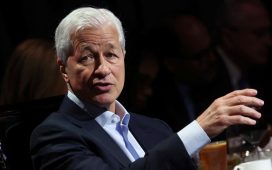Unlock the Editor’s Digest for free
Roula Khalaf, Editor of the FT, selects her favourite stories in this weekly newsletter.
Ann E Harrison is an economist and the 15th dean of the Berkeley Haas School of Business.
When British prime minister Rishi Sunak asked Elon Musk, last November, what he thought about artificial intelligence, the answer was eye-opening and even apocalyptic. “There will come a point where no job is needed,” Musk replied. “You can have a job if you want to have a job for personal satisfaction. But the AI will be able to do everything.”
Everything? National income in any country can be divided into the part that goes to owners of capital and the part that goes to owners of labour. Decades ago, economists such as Nicholas Kaldor believed that this division of national income between labour and capital was fixed for eternity.
My research on global incomes shows that Kaldor was wrong: there is nothing constant about labour’s share. In most countries, labour’s proportion of national income has been declining in recent years. Could one reason be Musk’s prediction about the power of new technology to replace jobs?
In the US, the decline in the share of the economic pie going to workers is dramatic. I call it “the great slide” because of the extent of the reduction. How did this fall happen? Simply put, profits rose but labour income stagnated as a share of company revenues. Between 1997 and 2019, profits nearly doubled for US-listed companies, from 8 per cent to 15 per cent of revenues. But wages and benefits did not climb as quickly: their share of revenues fell from 27 per cent to 12 per cent, and of value added from 52 per cent to 23 per cent.
Global MBA Ranking 2024

Read the ranking and report, plus how we compiled our league table. Spotlight on the MBA webinar, February 21: businesseducation.live.ft.com.
This is alarming. Worldwide, there is a direct relationship between the fall in national labour shares and rising inequality. In the US, after-tax income inequality is now at its highest level in 40 years. Greater inequality is often linked with more social unrest, more people living in poverty, and more extreme outcomes in elections.
One possible explanation is globalisation, which can hurt workers because they have a harder time relocating than owners. Another possibility is the growing market power of big companies, which can make it more difficult for employees to maintain their share of profits. A third explanation, as Musk suggested, is the technological changes that make it easy to replace people with machines.
I explored all three possibilities using millions of data points in Orbis, a system that compiles data on both publicly listed and private companies. The results suggest that, while all three factors play a role in the decline in labour’s share of GDP, the biggest driver is, indeed, the replacement of people with machines, rendering them — from an economic standpoint — obsolete.
Daron Acemoglu and Pascual Restrepo at MIT have calculated that each additional robot in the US eliminates 3.3 workers. My evidence suggests that a one percentage point increase in research and development expenditure is associated with a two percentage point decline in a company’s labour share (see Disentangling Various Explanations for the Declining Labor Share, NBER working paper).
Acemoglu and Restrepo also find, in other research, that most of the increase in inequality is due to workers who perform routine tasks being hit by automation. MIT economics professor David Autor and colleagues have shown that the biggest declines in labour’s share have occurred in manufacturing. But, in a few sectors, such as the finance industry, labour’s share has actually increased.
What can stop this wider decline in labour’s share? Some economists, such as the late Tony Atkinson, and others, including Bill Gates, have advocated for a form of universal basic income. Others, like Acemoglu, have suggested that public policy should favour humans, who can learn to use new technology. He writes with Pascual Restrepo of the need for “removing incentives for excessive automation”.
Along with two research co-authors, Acemoglu also claimed that the falling labour share in the US and Denmark could be explained in part by companies hiring cost-cutting, workforce-slashing MBA graduates. But that is akin to blaming a doctor who visits a sick patient for causing the illness. Companies hire MBAs when competition gets fierce and they need the strategic guidance that MBAs can offer.

At the very least, I believe policymakers should ensure that tax and subsidy incentives encourage companies to create more, and better, jobs. Right now, capital investments receive preferential tax treatments while payroll taxes discourage hiring more workers. Shifting incentives to invest in people instead of machines would help.
Promoting higher educational opportunities at reasonable cost (such as those provided by public universities like Berkeley) would shield individuals from the automation that targets routine work. Providing stronger social safety nets would prevent US leaders from turning to protectionist measures, such as tariffs, for relief from global competition. Cutting off trade will not help the average worker in China, and will not do much for the average worker in the US, either, because what is driving falling labour shares is technology.
As the head of a business school, I hope that this and future generations of leaders will always put people first. Forward-thinking business schools emphasise the many stakeholders inherent in every business decision, far beyond shareholders and their profits.







